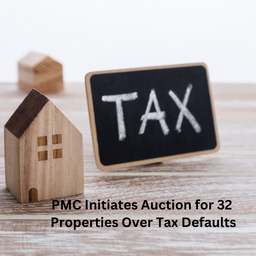Introduction: The Basics of Auction Property Deposit
Can be an exciting and potentially lucrative way to purchase real estate. However, one of the key differences between buying a property at auction and through traditional methods is the requirement for a deposit.
Another important purpose of auction deposits is to deter non-serious buyers from bidding at an auction. By requiring a deposit, auctioneers and sellers can ensure that only serious buyers are participating in the auction, which can help to drive up the price of the property.
In some cases, auction deposits may also be used to cover the costs of the auction, such as advertising and marketing expenses. However, this varies depending on the auctioneer or seller and the terms of the auction.
It is important for buyers to understand the purpose of auction deposits and to be aware of the deposit requirements before bidding at an auction. Buyers should also have the financial means to complete the transaction before placing a bid, as auction deposits are typically non-refundable. Overall, auction deposits serve as an important tool in ensuring a successful auction process for both buyers and sellers.
Factors That Determine the Amount of Auction Deposits
The amount of auction deposits can vary depending on several factors, including the type of auction, the value of the property being sold, and the terms set by the seller or auctioneer. Here are some factors that can influence the amount of auction deposits:
Type of Auction: The type of auction can affect the deposit amount. For example, online auctions may have lower deposit requirements than in-person auctions due to the reduced costs associated with conducting the auction.
Property Value: The value of the property being sold can also influence the deposit amount. Higher-value properties may require larger deposits to ensure the buyer is financially capable of completing the transaction.
Competition: The level of competition for the property can also impact the deposit amount. If there are multiple bidders interested in a property, the deposit amount may be higher to ensure only serious buyers are participating in the auction.
Seller/Auctioneer Requirements: The deposit amount may also be determined by the requirements set by the seller or auctioneer. Some sellers may require a fixed percentage of the sale price as a deposit, while others may set a flat fee amount.
Condition of the Property: The condition of the property being sold can also affect the deposit amount. Properties that require significant repairs or renovations may have higher deposit requirements to ensure the buyer has the financial means to complete the necessary work.
It is important for buyers to carefully review the auction terms and deposit requirements before participating in an auction. Buyers should also have a clear understanding of the deposit refund policy and any conditions under which the deposit may be forfeited. By understanding the factors that determine the amount of auction deposits, buyers can make informed decisions about their participation in an auction and ensure they have the financial means to complete the transaction if successful.
The Typical Deposit Range for Auction Properties
The typical deposit range for auction properties can vary depending on the type of property and the auctioneer's policies. In general, auction deposits for residential properties typically range from 5% to 10% of the property's value/price. Commercial properties, on the other hand, may require higher deposit amounts due to their higher values and risks associated with their use.
It is important to note that auction deposits are not fixed and may vary depending on the auctioneer and the seller's preferences. In some cases, auctions may require a fixed deposit amount regardless of the property's value/price. In other cases, the auctioneer may allow the buyer to negotiate the deposit amount, which may result in lower or higher deposit amounts than the typical range.
In addition, some auctioneers may require a minimum deposit amount to participate in the auction. This amount may be lower than the typical deposit range, but buyers should still ensure they have enough funds available to cover this minimum amount.
Buyers should always carefully review the auction's terms and conditions to understand the deposit requirements for a specific property. It is important to have a clear understanding of the deposit amount, the deposit deadline, and the consequences of failing to meet the deposit requirements.
How to Calculate the Required Auction Deposit
Calculating the required auction deposit is an important step for buyers interested in participating in an auction. The deposit amount is typically a percentage of the final purchase price, but other factors may impact the deposit calculation.
To calculate the required auction deposit, buyers should first determine the purchase price of the property they wish to bid on. Once they have determined the purchase price, they can then calculate the deposit amount based on the auctioneer's deposit policy.
For example, if the auctioneer requires a 10% deposit and the purchase price is $100,000, the required deposit amount would
Tips for Managing Auction Deposits
When buying an auction property, paying a deposit is a crucial part of the process. Here are some tips to help you manage your auction deposit:
Understand the terms and conditions: Before making a deposit, carefully read the terms and conditions of the auction to ensure that you understand the deposit requirements and the refund policy.
Prepare your finances: Make sure you have enough funds available to pay the deposit if your bid is successful. It is also advisable to have additional funds available to cover any unforeseen expenses, such as legal fees or repairs.
Use a reliable payment method: When paying your deposit, use a secure and reliable payment method, such as a bank transfer, to ensure that the transaction is traceable and protected.
Keep track of deadlines: Pay attention to the deposit deadlines and make sure that you pay on time. Failure to pay the deposit on time may result in the property being re-listed for auction.
Seek advice if in doubt: If you are unsure about any aspect of the auction deposit process, seek advice from a professional, such as a solicitor or a property auctioneer.
Be aware of the risks: Deposits are non-refundable, so be aware of the risks involved in buying an auction property and make sure that you are comfortable with the potential outcome.
By following these tips, you can manage your auction deposit effectively and increase your chances of a successful purchase.
What Happens to the Deposit if You Don't Win the Auction?
Auction deposits can be a significant sum of money, so it's natural to wonder what happens to the deposit if you don't win the auction. The answer to this question can vary depending on the specific auction and the terms and conditions set by the auction house or seller.
In many cases, if you don't win the auction, you will be refunded the full amount of your deposit. However, this is not always the case, and it's essential to review the terms and conditions carefully before placing your bid. Some auctions may specify that the deposit is non-refundable, while others may deduct a portion of the deposit as an administrative fee.
It's also worth noting that some auctions may require you to provide proof of funds before allowing you to bid. In these cases, the deposit may be used as evidence of your financial capability, and it may not be refundable if you don't win the auction.







